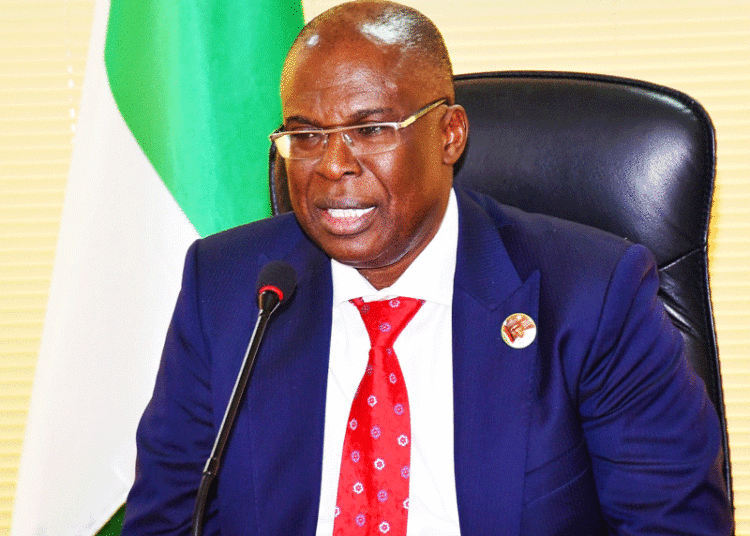Nigeria is now springing new investments which is seen among industry players as launching the country into a new phase of oil and gas revolution.
The country’s oil and gas industry in recent years has witnessed a lull resulting in production decline, making the country lose its leadership position in Africa.
Most current data as indicated in the monthly oil market report issued by the Organisation of Petroleum Exporting Countries (OPEC) said that Libya had topped the list of African oil producers in last October with 1.163 million barrels per day (bpd), while its production increased by 6000 bpd.
According to the report, Libya is followed by Angola: 1.067 million bpd, Algeria with 1.060 million bpd, while Nigeria’s oil production amounted to 1.024 million bpd.
The report, indicated that Libya has taken Nigeria’s place, which is far from its average of 1.493 million bpd in 2020 and 1.323 million bpd in 2021.
OPEC oil production decreased by 210,000 bpd in October 2022 to drop for the first time in five months, following the decline in supplies from Saudi Arabia and Angola, according to the OPEC+ alliance agreement.
The report said the total crude production in the 13 member countries of OPEC decreased to 29.494 million bpd last October, compared to 29.704 million bpd in the previous month.
The decline in OPEC oil production comes as a result of the OPEC+ alliance’s announcement to reduce supplies by 100,000 bpd in October, as the alliance announced a new policy, early last month, aimed at reducing oil production by two million bpd at the beginning of November 2022, until December 2023.
But the situation is about to change with stakeholders in the oil and gas industry submitting that Nigeria is now more forward looking in efforts to develop her natural resources, just as
The affirmation is coming as President Muhammadu Buhari, flagged off the validation phase of the first integrated Oil Development project in northern Nigeria on Tuesday.
The latest effort backs a recent move by the Nigerian National Petroleum Company (NNPC) Limited to reverse huge losses incurred since the beginning of the year after.
The NNPC, had successfully executed agreements for the renegotiated Production Sharing Contracts, PSC, with contractors in five Oil Mining leases.
It is projected that the deal would transform the oil and gas industry as well as unlock over $500 billion in revenue from its oil resources.
The contract execution deal came few months after the NNPC transited to a limited liability company.
According to reports, the NNPCL recorded a project funding underperformance of $1.216 billion between January and June 2022.
It was also reported that the NNPCL defaulted in its projection in the first six months of 2022 by $1.216 billion.
According to data, whereas the firm projected to spend over $500 million for each month, $333.4 million was expended in January, and the figure dropped to $18.1 million in February.
The funding for priority projects rose again in March to $294.3 million and $150.5 million in April and caved in to $113.3 million in May and $249.8 million in June.
It was further reported that while the monthly forecast for cost recovery and funding of government priority projects was $536 million, total projected spending for the purpose for 2022 was kept at $3.21 billion.
The situation has become dire such that the company became incapacitated such that it could not meet its monthly financial obligation to the joint account operated by federal, state and local governments.
The NNPC prior to this and specifically in 2021, reported a deficit of over $2.6 billion for cost recovery and priority projects, even when it budgeted about $5.8 billion for the purpose.
While through cost recovery, a party is able to recoup its capital and operating costs out of a specified percentage of production, the NNPC also has major oil and gas projects meant to boost the country’s production.
Some of the projects, which have been on for years include domestic gas development initiatives, frontier exploration, renewable energy and the Nigeria/Morocco pipeline.
However, some of these would be reversed following the company’s renewed agreements in OMLs 128, 130, 132, 133, and 138.
Industry operators have expressed confidence that the contracts would definitely unlock investment in the upstream sector and boost investors’ confidence.
Commenting on the renewed PSCs, group CEO, NNPC, Mallam Mele Kyari, said renegotiations of the assets were in line with the provisions of section 311 of the Petroleum Industry Act (PIA) 2021 with other improvements to the PSCs aimed at driving performance in the PSC operations.
Kyari said the negotiations were completed within the timeframe specified by Petroleum Industry Act, PIA for all re-negotiated PSCs, stressing that “the “meaning of this is that there is now a great deal of clarity between NNPC Ltd and its partners in the deepwater space.”
Kyari commended President Muhammadu Buhari for his leadership in providing the NNPC and its contractors the opportunity to achieve the milestone through the PIA, thereby offering more opportunities for boosting the nation’s crude oil production and revenue base.
The new acreages at the Kolmani OPLs 809 and 810 exploration sites is located in a border community between Bauchi and Gombe states.
In February 2019, Buhari flagged Off the landmark spud-in ceremony of Kolmani River II Well.
By October 2019, the Nigerian National Petroleum Company (NNPC) Limited (formerly Nigerian National Petroleum Corporation), announced the discovery of crude oil, gas and condensate in the Kolmani River region at the border community between Bauchi and Gombe states.
The commercial quantity discovery was the first in the region after eight months of crude oil exploration on the Upper Benue Trough, Gongola Basin in the north-eastern part of the country, according to NNPC.
Section 9 of the Petroleum Industry Act signed by Buhari established Frontier Exploration Fund (FEF) with the allocation of 30 per cent of profit oil and profit gas from NNPC’s upstream oil & gas contracts (production sharing, profit sharing & risk sharing contract) for the purpose.
The fund is for the development of “frontier acreages” — part of these frontier acreages include those Anambra, Dahomey, Bida, Chad & Benue trough.
In the first seven months of 2022, NNPC, expended about N3 billion in frontier exploration services.
The official kick off the drilling of crude oil in the north is coming about two years after the mineral resource was discovered in the region.
This according to stakeholders is a major boost to the efforts by the federal government to ensure that the region produces crude oil in commercial quantities.
The president is expected to carry out the historic exercise with the support of the minister of state for Petroleum, Mr. Timipre Sylva and the group chief executive officer of the Nigerian National Petroleum Company Limited (NNPC), Mallam Mele Kyari, among others.
It was further learnt that the oilfields in Bauchi and Gombe states will be developed by Sterling Global Oil, New Nigeria Development Commission (NNDC) and the NNPC Limited.
The ceremony will be held on Tuesday, November 22, and will be attended by Mr. President himself together with most of his cabinet members including the minister of state for Petroleum, Timipre Sylva,” said an official of NNPC, who spoke off the records.
Last year, the Nigerian Petroleum Development Company (NPDC) issued a request for expressions of interest (EoI) on the development of the two licences in Nigeria’s North-east.The integrated development of OPLs 809 and 810 in the Gongola Basin, in the Upper Benue trough extends about 1,000 km from the Bight of Benin to Lake Chad. Before then, the NPDC said it had discovered “huge commercial quantities” of oil and gas in the Kolmani River, adding that the blocks were more than 700 km from the coast, posing challenges to export options.It also proposed an onsite midstream refinery and power plant, saying that this would allow it to use these resources for local needs as well as “create an industrial hub” to provide economic benefits and employment.
point in the development of the facilities, in the midstream, the plan would involve a 150 MW power plant and a 50,000 barrel- per day condensate refinery. The NPDC, as it was then called, had drilled the Kolmani River 2 well in 2019 and the Kolmani River 3 in early 2021. Bauchi state governor, Senator Bala Mohammed, had also recently said the oil and gas exploration at Kolmani River in Alkaleri Local government area of the state by the NNPC would ‘reverse the narrative of poverty and underdevelopment’ in the state.
The NNPC Limited has over the years expended monies on frontier exploration, but the spending has now been statutorily ingrained in the new Petroleum Industry Act (PIA) 2021.
The new piece of legislation has now raised funding for frontier exploration to 30 per cent, which implies that the NNPC Limited would have more funds to develop oil fields around the country.
According to the Nigerian Upstream Petroleum Regulatory Commission (NUPRC), Nigeria currently has crude oil reserves of about 37 billion barrels.Kolmani fields could hold as much as one billion barrels crude oil reserve, which could significantly raise Nigeria’s oil reserve.
The oil discovery in the north is coming at a time crude oil production has dropped to around one million barrels per day in the country, as a result of oil theft and vandalism, thereby hobbling the ability of the country to earn foreign exchange.
Emmanuel Iheanacho Chairman/CEO of Integrated Oil and Gas, while reacting to the event said the country stands to benefit from this as it will help the country to meet its OPEC quota and restore its position as top oil producer in the continent.
Iheanacho, who spoke with LEADERSHIP on the issue said the president has taken the right decision to further deepen investment in the sector.
“I see this as a welcome development and so long as seismic report shows the oil is in commercial quantity in those assets, it will go a long way to benefit the nation economically.
It is our natural resources and I support every effort aimed at advancing the economy and providing more foreign exchange for the country” Iheanacho former Minister of Interior said.
On his part, chief executive officer, CEO, Center For The Promotion Of Private Enterprises, CPPE, Dr. Muda Yusuf said the political will of the president to commence oil drilling in the north should be applauded.
Yusuf, who is the former Director General of the Lagos Chamber of Commerce and Industry, LCCI, said the move will create more job opportunities in the country because it will drive new investments and also generate more foreign exchange.
He expected the federal government to initiate fresh moves to address insecurity which could be seen as a threat to the investment.
“I think one thing this will bring about is a new security initiative as widening insecurity is threatening investment across the entire energy sector. So I want to challenge government to draw a new security plan to safeguard expected investment from this initiative” he said.
Reports indicates that with an estimated 1 billion barrels of crude oil reserve from the new northern oil wells, Nigeria is expected to gain nearly $73 billion or N32.3 trillion at an average global crude oil price of $73 per barrel benchmark used for the 2023 budget proposal. This earning could be realised over a period of 10 years; depending on when commercial production starts.
The Nigerian Upstream Petroleum Regulatory Commission (NUPRC) said crude oil reserves were at 37 billion barrels. With 1bn oil and perhaps gas reserves coming from the Kolmani fields, Nigeria’s oil and gas reserves could shoot up higher.
According to reports the current crude reserve shows that the reserve slightly grew by 0.37 per cent to 37.046bn barrels as of January, 2022, from 36.910bn barrels in 2021. Gas reserves rose by one per cent to 208.62 Trillion Cubic Feet (TCF) from 206.53TCF. It is expected that gas reserves could grow to 220TCF in less than 10 years and 250TCF afterwards.
The integrated development process of the project entails that NNPC will not only drill the crude but also build a refinery that will process it into white products and also build a power plant which will utilise the energy from the wells to produce electricity. This is because at over 700km from the coast, export and utilisation options of the crude is tough.
At the upstream level, there will be reprocessing of about 738 square kilometres of high-resolution 3D seismic data that have been captured earlier for the prospects area. The developers will also engage in delivering the integrated field studies and development plan for the Kolmani Main and the Kolmani South East fields, which are the two prospect areas.
At the midstream level, NNPC will establish gas processing facilities and a power plant that could generate at least 150 megawatts (MW) of electricity around the oilfield.
While expert firms operate the oil and gas midstream assets on their behalf, the partners will construct, operate and maintain a condensate refinery that could refine a minimum of 50,000 barrels per stream day (bpsd).
It is expected that the plan is to create an industrial hub around the oil field will spur national economic growth, create employment opportunities, promote social prosperity, enhance energy security, and provide optimal returns to investors.
The NNPC has spent about N14.3 bin on frontier exploration service since this year as captured by August FAAC report.
According to the report, the NNPC Ltd spent N3.8 billion in January, N1.2bn in March, N2.9 billion in April, N2.1bn in May and N4.2 bilion in June with expectations to spend N29.4bn at the end of year on new oilfields exploration.
Kyari, commended President Muhammadu Buhari for his leadership in providing the NNPC and its contractors the opportunity to achieve the milestone through the PIA, thereby offering more opportunities for boosting the nation’s crude oil production and revenue base.
According to Comrade Brown Ogbeifun, former President of the Petroleum and Natural Gas Senior Staff Association of Nigeria (PENGASSAN), said the NNPC under its new structure has done so much to lift the industry and create new investment opportunities.
He said the journey of the NNPC to a private sector commercial entity commenced with the passage of the Petroleum Industry Act, PIA in 2021. It subsequently got incorporated with the Corporate Affairs Commission (CAC) with a floated initial capital of N200 billion on September 21, 2021. By all standards, that remains the highest share capital in Nigeria.
Ogbeifun, shared the belief that a well managed NNPC will help the country achieve its energy security plan and would no longer run at loss.
He recalled that the Nigerian National Petroleum Company Limited transformed into a legally regulated Companies and Allied Matters Act (CAMA) entity on July 1, 2022 which was done to align and conform with the provisions of Section 53(1) of the Petroleum Industry Act 2021
Ogbeifun, an Accredited Mediator of the Centre for Effective Dispute Resolution-UK, who had served as a Committee member on Socio-Economic Impact of Downstream Deregulation in Nigeria and the Privatization of NNPC Downstream Sector, explained that what it now translates to is that NNPC Ltd has now been created as a private sector and commercial mindset entity for optimum productivity and profitability, improved its transparency and accountability profile, and emplace better collaborations and coordination between the NNPC, Limited and the Federal Internal Revenue Services, Nigerian Extractive Industry Transparency Initiative (NEITI), Central Bank of Nigeria (CBN), Ministry of Finance, Nigerian Upstream Petroleum Regulatory Commission, the Ministry of Petroleum Resources NUPRC) ‘The Commission,’ Nigerian Midstream and Downstream Petroleum Regulatory Authority NMDPRA, ‘The Authority,’ etc.
Besides, Ogbeifun said, that a well-managed NNPC as a private concern would generate more taxes into the federal government coffers. The certainty of a legal framework assures investors of legal protection from the hitherto used rule of thumb, thereby boosting investor confidence and spurring them to invest in an oil and gas industry that would emerge as a hub for petroleum investments in the continent.
Furthermore, the PIA empowers the NNPC to determine and keep viable assets and do away with identified toxic assets, focusing on gas investments. The frontier exploration for more oil and gas reserves shall be enhanced and would be free to determine entrance and exit into new investments. It shall also have the power to raise funds from the capital market to fund its operations.
Muda Yusuf, equally reacted by saying that dysfunctional policies governing our oil and gas sector are some of the major headwinds to the growth and development of the Nigerian economy.
The policies have discouraged investments in the sector, perpetuated corruption, entrenched inefficiencies and compounded the fiscal challenges of government.
Yusuf, said that added to the policy problems is the insecurity, vandalisation of oil installations, and massive theft of crude oil.
“It is a combination of policy and governance failures. Rather than take advantage of high oil price to build fiscal buffers, improve our foreign reserves and strengthen our currency, we are experiencing the exact opposite. It is one of the biggest economic tragedies of our time. The economy is experiencing serious bleeding from the fuel subsidy regime, the equalization fund and the theft of crude oil.” he noted.
He said with the new initiative embarked by the new NNPC Limited, there will be great level of operational transparency and injection of funds in new projects that will in turn generate jobs and revenue for the country.





